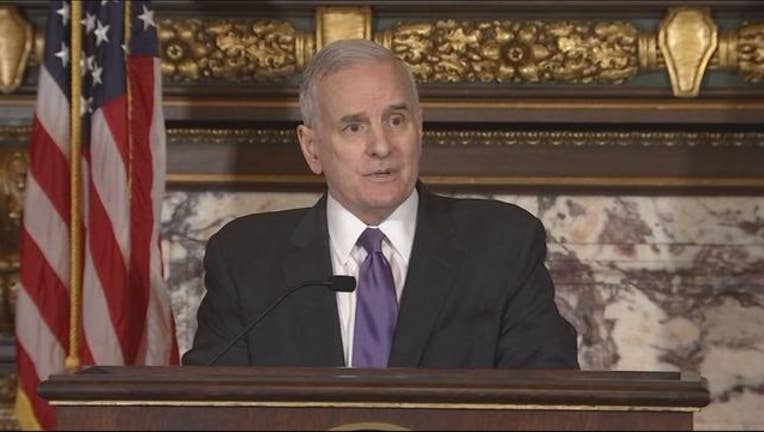MN Supreme Court rules Dayton's veto of legislative funding constitutional

ST. PAUL, Minn. (KMSP) - The Minnesota Supreme Court has ruled Gov. Mark Dayton’s line-item veto of funding for the Minnesota Legislature is constitutional. However, the Court ordered mediation to resolve the dispute.
In the Court’s order issued Friday, it wrote, “Based on the plain language of Article IV, second 23 of the Minnesota Constitution, we hold that the Governor’s exercise of his line-item veto power over the appropriation for the Legislature’s biennial budget was constitutional under that provision.”
The justices further wrote, “This conclusion does not, however, end the matter.”
The order holds that the two branches of government should resolve their differences through the political process. Therefore, the Court has ordered both sides into mediation. Dayton and the leadership from the Minnesota Legislature have until 4 p.m. on Tuesday, Sept. 12, to provide to the Court a mediator they have agreed to. They have until Sept. 30 to notify the Court on their progress in mediation.
The constitutional battle began after the close of the legislative session in May. Dayton used his line-item veto authority to cancel the funding for the Minnesota House and Senate as leverage to call them back into special session to rescind a tax cut on some tobacco products along with several other issues Dayton wanted lawmakers to resolve. House Speaker Kurt Daudt and Senate Majority Leader Paul Gazelka sued the governor in Ramsey County Court on the grounds the line-item veto of legislative funds violated the separation of powers clause in the constitution.
Chief Judge John Guthmann agreed and ruled the governor’s line-item veto unconstitutional on July 19. In his order, Judge Guthmann wrote that Dayton’s veto, “effectively abolished the Legislature.” He then ruled the veto, “null and void.”
But the Supreme Court notes that given the stipulation orders agreed to by the governor and the Legislature to continue funding until the case is resolved, the Justices believe the Legislature can still function. The justices made it clear that they are reluctant to intervene on the constitutional powers of the two branches. Their order writes, “A proper respect for our co-equal branches of government counsels that we intervene in their dispute only when absolutely necessary.” The order strongly hints that intervention may come after all available funding for the legislature has been spent.
In a statement, Governor Dayton said he is pleased that the Court affirmed his right to line-item veto legislative funds.
“I am also pleased that the Supreme Court ordered the Legislature and myself to ‘participate in good-faith efforts to resolve this dispute through mediation,’” the governor said. “I remain ready and very willing to engage in those negotiations immediately. I have asked my legal team to contact their legislative counterparts to begin to resolve this matter.”
House DFL Leader Melissa Hortman released the following statement:
"Minnesotans expect their elected officials to collaborate on solutions to benefit everyone, but Republicans chose to go to court instead of negotiate in good faith with the Governor. This summer, I joined Governor Dayton in calling on the Republican majorities to return to the negotiating table and work to craft a long-term, sustainable budget for Minnesota. Given the Court's order, all sides must come together with a spirit of compromise and collaboration in order to reach an agreement that will better serve Minnesotans. I look forward to working with Governor Dayton, Senator Bakk, and Republican leadership to do so."
Senate Majority Leader Paul Gazelka and Speaker of the House Kurt Daudt released the following joint statement:
“We are pleased today’s order recognized Minnesotans’ right to a functioning legislative branch of government. While we do not dispute the governor’s line-item veto authority, the court order also recognized that “Constitutional powers may not be used ‘to accomplish an unconstitutional result.’”
"Today's order did not decide the case or vacate the lower court's ruling, and we are ready to go to mediation to secure funding for the legislative branch of government. We worked in good faith in the past to attempt to breach this impasse, and will work in good faith again as we look ahead to the mediation process.”

